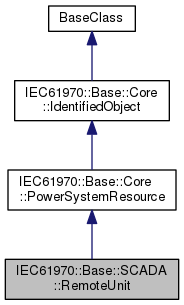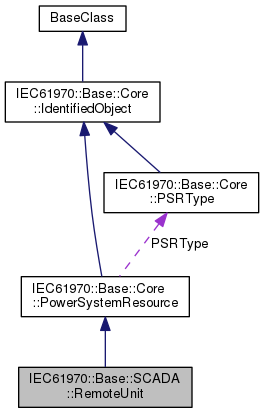#include <RemoteUnit.h>


Public Attributes | |
| IEC61970::Base::SCADA::RemoteUnitType | remoteUnitType = IEC61970::Base::SCADA::RemoteUnitType::_undef |
| std::list< IEC61970::Base::SCADA::RemotePoint * > | RemotePoints |
 Public Attributes inherited from IEC61970::Base::Core::PowerSystemResource Public Attributes inherited from IEC61970::Base::Core::PowerSystemResource | |
| std::list< IEC61970::Base::Meas::Control * > | Controls |
| std::list< IEC61970::Base::Meas::Measurement * > | Measurements |
| IEC61970::Base::Core::PSRType * | PSRType |
 Public Attributes inherited from IEC61970::Base::Core::IdentifiedObject Public Attributes inherited from IEC61970::Base::Core::IdentifiedObject | |
| IEC61970::Base::Domain::String | aliasName |
| IEC61970::Base::Domain::String | description |
| IEC61970::Base::Domain::String | mRID |
| IEC61970::Base::Domain::String | name |
| std::list< IEC61970::Base::DiagramLayout::DiagramObject * > | DiagramObjects |
A remote unit can be a RTU, IED, substation control system, control center etc. The communication with the remote unit can be through various standard protocols (e.g. IEC 61870, IEC 61850) or non standard protocols (e.g. DNP, RP570 etc.). A remote unit contain remote data points that might be telemetered, collected or calculated. The RemoteUnit class inherit PowerSystemResource. The intention is to allow RemotUnits to have Measurements. These Measurements can be used to model unit status as operational, out of service, unit failure etc.
| std::list<IEC61970::Base::SCADA::RemotePoint*> IEC61970::Base::SCADA::RemoteUnit::RemotePoints |
Remote points this Remote unit contains.
| IEC61970::Base::SCADA::RemoteUnitType IEC61970::Base::SCADA::RemoteUnit::remoteUnitType = IEC61970::Base::SCADA::RemoteUnitType::_undef |
Type of remote unit.
 1.8.13
1.8.13